Breaking down the barriers
Social housing for people with disabilities in Europe
Brussels, 3 April 2003 | Published in Social
A special report about the work of social housing associations across Europe in supporting people with disabilities.
Produced by Bill Randall
From the Introduction by Housing Europe former President, Andrew Malone:
" 'Disabled people don’t have to be handicapped’, says Rita-Leena Karlsson Stockholm’s, Ombudsman for the Functionally Disabled. Social housing organisations in the European Union support this view by their actions, as this report shows.
Produced for CECODHAS, the European Liaison Committee for Social Housing, to mark the European Year of People with Disabilities (EYPD), the report catalogues the many and innovative ways in which housing associations, companies and co-ops are breaking down the barriers to liberate disabled people across the European Union.
While the solutions are diverse, the principles that underpin them are constant. All the projects
featured seek to:
- Give greater independence to disabled people
- Empower disabled people by giving them a greater say in the design and management of their homes
- Help disabled people integrate into the wider community.
It is important work. About 10 per cent (37 million) of Europe’s 370 million adults and children are disabled and 10 per cent of them (3.7 million) have a serious disability. One in four Europeans has a family member affected by a disability. Disability takes many forms. The 1,400 members of the English National Housing Federation, for instance, provide supported housing for more than 19,000 men and women with mental health problems or drug or alcohol related problems.
[…]
Yet the scale of their response is not enough. Many disabled men and women are able to stay in
their own homes, particularly if the homes are built to Lifetime Homes standards or are adapted to meet their needs. However, more financial help is needed from Governments to produce the purpose-built houses, flats and bungalows that can help severely disabled people make the most of their abilities in the mainstream of life.
This is the third special CECODHAS report looking at the work of its members for particular groups. The first dealt with social housing and the fight against racism and the second at housing for older people. CECODHAS recommends the work of the housing organisations described in this report and thanks the Joseph Rowntree Foundation, the National Housing Federation, Nottingham Community Housing Association and Habinteg Housing Association for supporting its publication."